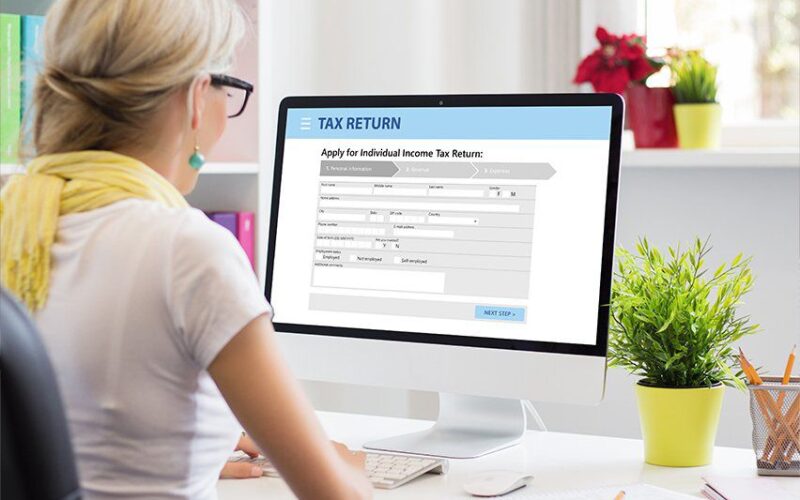According to the Internal Revenue Service (IRS), over 25.5 million sole proprietorships exist in the United States, making it the most common type of business ownership. There is a rationale behind this: A sole proprietorship is a straightforward way to operate a small business, as it takes no paperwork to get started. Therefore, the majority of new business owners begin as sole proprietors. Many solo owners eventually form a limited liability company (LLC) for liability protection. With an LLC, your personal liability is minimized, allowing some small business owners to rest easier. However, converting to a limited liability company may potentially affect your tax obligations. This article will discuss the various requirements to file business taxes for LLC online business partnership with no income.
What Is an LLC?
A limited liability company (LLC) is a type of corporate entity that can have one or more owners, known as “members.” Members of an LLC normally engage equally in business management, unless they choose an alternate structure known as “manager management.”
A significant characteristic of LLCs is “limited liability,” which protects all LLC owners from personal liability for business debts and claims. This implies that if the firm cannot pay a creditor, such as a supplier, a lender, or a landlord, the creditor cannot lawfully seize the home, car, or other personal property of an LLC member. Due to the fact that only LLC assets are utilized to pay off corporate debts, LLC owners risk losing only the money they have invested in the LLC.
In addition, for tax reasons, an LLC is not considered independent from its owners. Instead, it is a “pass-through entity” as defined by the IRS, such as a partnership or sole proprietorship. This means that business income is passed through to the LLC members, who declare their portion of earnings or losses on their individual tax returns.
How LLC Pay Income Taxes
A wide variety of business taxes may fall under the responsibility of LLC owners. For the majority of business owners, federal, state, and local income taxes represent the greatest financial burden. How you file and pay income taxes (online) depends on whether your LLC has a single owner (single-member LLC) or numerous owners (multi-member LLC) (a multi-member LLC).
#1. Income Taxes for Single-Member LLCs
For federal income tax purposes, the IRS classifies a single-member LLC as a disregarded entity by default. According to Vincent Porter, CPA of MyTexasCPA, “a disregarded entity” means that the LLC is not required to file a separate income tax return to report income and expenses either offline or online. The member’s income and expenses will be reported directly on his or her tax return.”
In other words, as the sole owner of an LLC, you will record company revenue and costs on Schedule C of Form 1040, just as a lone proprietor would. If, after deducting business expenses, the LLC earns a profit for the year, the owner will owe IRS taxes at their personal income tax rate. If the LLC works at a loss for the year, the owner may deduct the losses from his or her personal income.
#2. Income Taxes for Multi-Member LLCs
For federal income tax purposes, multimember LLCs are considered flow-through entities. As with the single-member LLC, this means that the LLC does not pay its own taxes. Instead, each member pays taxes on the business’s income in accordance with their share of ownership. Thus, the LLC tax rate corresponds to the individual income tax bracket of each member.
If, for example, two members of an LLC have a 50-50 ownership split, each owner is responsible for paying taxes on one-half of the business’s income. Each member may also claim one-half of the tax deductions, tax credits, and losses that the LLC is eligible for. This form of tax functions essentially identically to a partnership.
#3. Choosing Corporate Tax Status for Your LLC
The default income tax laws for LLCs have been described thus far, but things can become more complex. The members of an LLC might elect for the business to be taxed as either a C-corporation or an S-corporation. In the operating agreement of the LLC, the necessary voting mechanism and consent will be specified.
Your LLC can elect to be a C-corporation by filing IRS Form 8832. (your state might also require additional forms for a change in tax status). If you make this modification, your LLC will be liable to the federal corporate tax rate of 21 percent. You must use Form 1120, U.S. Corporation Income Tax Return, to file your LLC taxes online. You must additionally pay state and local corporation taxes based on the location of your business.
How to File Taxes as a Single-Member LLC Online
If you are the only member of your LLC, the IRS will classify you as a disregarded entity for tax purposes (unless you elect otherwise). Therefore, your tax situation will resemble that of a sole proprietorship (i.e., the business will not be taxed separately from the owner). Profits and losses are on to the owner.
To file and pay taxes as a single-member LLC, you must attach Schedule C to your individual income tax return. On Schedule C, you will list your business’s income and costs. This amount will subsequently be income or loss on Form 1040, Individual Income Tax Return.
If your LLC holds rental properties, the information should be provided on Part I of Schedule E, not Schedule C.
How to File as a Multi-Member LLC
If more than one person owns the LLC, it is a partnership for tax purposes. Filing is slightly more complicated for a multi-member LLC than for a single-member LLC. Form 1065, the limited liability company must complete a Partnership Information Return. In addition, it must give each member of the LLC a Schedule K-1, which details each partner’s portion of income, deductions, and credits.
Include the information from your K-1 in Part II of Schedule E on your Form 1040.
The due date for Form 1065 and Schedule K-1 is March 15. The deadline date for submitting this information on Form 1040 and Schedule E is April 15.
How Does an LLC Affect My Personal Taxes?
The LLC entity is not recognized by the IRS as being distinct from the owner because of this distinction. This indicates that the LLC will, in most cases, file the company tax information along with your personal tax returns on Schedule C. In essence, this means that the LLC will not pay its own business taxes. Your other income, including the profit or loss from your enterprises, is included on Form 1040 alongside the rest of your income.
Should I Pay Myself a Salary from My LLC?
Should I go ahead and give myself a salary? If you are the only member of your limited liability company, you will need to take a draw or distribution. It is not necessary for you to pay yourself a wage as an employee. As long as your limited liability company is structured as a partnership, you have the ability to pay yourself by taking a draw even if you are a member of a multi-member LLC.
How Do I Reimburse Myself from an LLC?
How can I reimburse myself if I am operating as a sole proprietorship or as a single member of an LLC? When dealing with a sole proprietorship or a disregarded business (such as a single-member limited liability company), a formal reimbursement policy is not required. When you file your taxes, all you have to do to claim a deduction for the percentage of a cost that was related to your business is use Schedule C.
How to File Business Taxes for LLC Partnership
Partnerships are exempt from federal income tax law. Instead, the income, losses, deductions, and credits of the partnership are passed through to the partners, who report and pay taxes on these amounts as part of their individual income tax filings. Even though an LLC business partnership is not taxed, they are required to file annual tax returns unless they have no revenue or costs.
Here are the five procedures you must take in order to submit taxes file for your LLC business partnership online or offline.
#1. Prepare Form 1065, U.S. Return of Partnership Income
Every LLC business partnership must file a federal partnership tax return on Form 1065 with the Internal Revenue Service. On this form, you will report the entire revenue or loss of the partnership.
You will detail deductions including salary, guaranteed partner payments, rent, repairs, taxes, depreciation, and employee benefit programs. Your partnership’s ordinary business income is its entire income minus its deductions.
You must also complete multiple Form 1065 schedules. Schedule B contains a number of inquiries on your partnership, including the categories of partners, ownership of corporate shares, and distribution methods.
Schedule K is a list of income and costs used to generate shareholder K-1 forms. The balance sheet is on Schedule L. Certain partnerships must also finish schedules M-1, M-2, and/or M-3.
#2. Prepare Schedule K-1
Generally, partnerships must additionally file a federal Schedule K-1, Partner’s Share of Income, Deductions, Credits, etc., for each person who was a partner at any point during the tax year.
On the K-1 form, the partner’s name, address, and percentage share of earnings, losses, capital, and liabilities are on the list. The next detailed detail is the partner’s share of ordinary business income or loss, rental income or loss, and interest income. It also covers the partner’s income, credits, and distributions from self-employment.
#3. File Form 1065 and Copies of the K-1 Forms
Partnerships must submit K-1 documents along with their Form 1065. The Form 1065 submission deadline is March 15.
The majority of partnerships can submit the forms electronically or via mail.
#4. File State Tax Returns
Your state may mandate that partnerships file state tax returns. Partnerships may be to pay franchise, excise, or sales taxes, depending on the state. On the website of your state’s department of revenue, you can locate the state’s tax filing requirements.
#5. File Personal Tax Returns
You must record your share of the partnership’s revenue or loss on your federal income tax return if you are a general or limited partner. The Schedule K-1 provided by the partnership will contain the necessary information.
In addition, if you are a general partner, your partnership income is often regarded as income from self-employment. You will include this information on your personal tax return and use Form SE to calculate self-employment tax.
Does the IRS Allow LLC Members to Receive a Salary?
Members of your LLC will not be able to be deemed employees and will not be able to receive a wage if the business is taxed according to the default regulations. However, if you opt to have the LLC taxed as a corporation, members of the LLC who actively work for the LLC may be considered employees and may be paid a salary. This is only the case if you want to have the LLC treated as a corporation.
How Far Back Can You Claim Expenses for LLC?
During their first year in business, LLCs can deduct some of the costs associated with running the business. If the costs of the initial year are not deducted during the initial tax year, the option to amortize the cost over the following 180 months is available. The Internal Revenue Service is the agency that decides whether or not a cost associated with starting a limited liability company can be deducted.
How Do Business Owners Pay Themselves?
When operating as sole proprietors or as partners, business owners can easily pay themselves by taking money out of the company. At the end of the year, those personal withdrawals are factored into the calculation of profit and are subject to taxation. Throughout the course of the year, transfer some of your earnings into a savings account that is separate from your checking account so that you will have the funds necessary to pay the tax bill when it is due.
Is LLCs Worth it?
The formation of a limited liability company (LLC) provides significant advantages to the majority of owners of small to medium businesses. When a company is registered and run as an LLC, the owners enjoy a number of benefits that are typically dispersed among a variety of other business structures. These benefits include legal protection for their personal assets, credibility, and a lengthy list of additional benefits.
How to File Taxes for LLC With No Income
You must always submit LLC taxes whenever there is a business activity, including income, deductions, and credits. In the absence of any company activity, you may be exempt from completing your federal tax return. However, if you generate income, you must file your personal tax return.
Depending on how your LLC is taxed, you may be compelled by law to file business taxes despite having no income. LLCs have the option to be in a variety of ways, and each taxation status has its own set of filing requirements.
State tax filings must not be neglected. As businesses are registered at the state level, you may be obliged to file a state return even if you are exempt from filing federally. State tax return information is available on the website of your state’s tax agency.
Regardless of your LLC’s tax classification, operating at a loss or having no income does not prevent you from filing a tax return. It is important by law for a limited liability company with expenses but no income to submit taxes. Through the net operating loss deduction, LLCs with no income but deductible expenses can offset future personal income or corporate income.
If your company’s deductions and credits cancel out its revenues, meaning it has reached its break-even point, you must still file an LLC tax return to report the activity.
In summary, you must submit LLC taxes whenever your business generates income. Whether from sales or loans or if it qualifies for a deduction or tax credit. By filing annual business returns, you prevent the Internal Revenue Service from penalizing you for failing to file. When you don’t consistently file a tax return, you also run the risk of seeming as though your business is a hobby.
Can I File My LLC Taxes Separately?
Since an LLC is a business, can you file taxes separately from your personal tax return? Yes and no is the answer. It depends on the tax structure of your LLC. Pass-through entities include LLCs with a single member, partnerships, and S corporations. This means that all gains and losses are on your tax return.
However, if you are taxed as a partnership or S company, you must file two reports and put the LLC’s revenue and losses on your personal 1040 tax return.
If you elect to be taxed as a C corporation, you will file a separate tax return, company income and losses will not pass through to your personal tax return.
FAQs
What is better LLC or sole proprietorship?
A sole proprietorship is advantageous for tiny, low-profit, low-risk enterprises. A sole proprietorship does not provide asset protection. An LLC is an ideal option for the majority of small business owners since it protects their personal assets.
Can you have an LLC without a business?
In the majority of states, incorporating an LLC does not require a business license; nonetheless, you must adhere to your state’s rules. A limited liability company must register with the state and submit the necessary paperwork.
What are the tax benefits of an LLC?
One of the most significant financial benefits of operating a business through a limited liability corporation is the possibility to avoid paying taxes twice.






